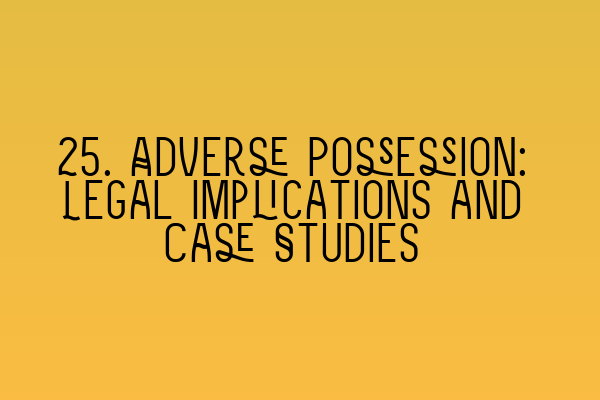25. Adverse Possession: Legal Implications and Case Studies
If you are involved in property law, you may have heard the term “adverse possession” thrown around. But what exactly does it mean, and what are the legal implications associated with it? In this article, we will explore the concept of adverse possession, delve into some case studies, and provide insights into how it may impact your practice. Let’s dive in!
Understanding Adverse Possession
Adverse possession refers to the legal doctrine that allows an individual to gain ownership of another person’s property by occupying and using it openly, without the owner’s permission, for a specified period of time. It is a unique legal concept that aims to balance the interests of property owners with the principle of rewarding those who have effectively utilized abandoned or neglected land.
In most jurisdictions, the requirements for a successful adverse possession claim include open and notorious occupation, exclusive possession, continuous use, and a specified period of time (typically ranging from 5 to 20 years). The individual seeking adverse possession must also show that they have been treating the land as if they were the true owner, such as by paying property taxes or making improvements to the property.
Legal Implications of Adverse Possession
The legal implications of adverse possession can be significant and complex, both for property owners and those claiming adverse possession. For property owners, the stakes are high, as they risk losing ownership of their land if someone successfully establishes adverse possession. On the other hand, claimants face the burden of proving their case, often against the presumption that the registered owner is the true owner.
In cases involving adverse possession, a court will carefully consider the evidence presented, including the claimant’s occupation and use of the land, the owner’s knowledge or lack thereof, and any acts or intentions that may affect the claimant’s legal rights. Additionally, the court will consider public policy considerations, such as preventing land from lying dormant or ensuring fairness and justice for all parties involved.
Case Studies
Let’s take a look at two notable case studies that illustrate the legal implications and complexities of adverse possession:
Case Study 1: Smith v. Roberts
In this case, Ms. Smith claimed adverse possession of a strip of land adjacent to her property that she had been using as a driveway for over 10 years. The registered owner, Mr. Roberts, was unaware of Ms. Smith’s use of the land until she filed a claim for adverse possession.
The court, upon considering the evidence, ruled in favor of Ms. Smith, highlighting her continuous and exclusive use of the land without objection from Mr. Roberts. The court also noted that Ms. Smith had made substantial improvements to the driveway, further solidifying her claim to the land.
This case demonstrates the importance of consistent, open, and notorious occupation when claiming adverse possession, as well as the significance of improvements made to the property.
Case Study 2: Brown v. Johnson
In this case, Mr. Brown claimed adverse possession of a small vacant lot next to his property. Mr. Johnson, the registered owner, was aware of Mr. Brown’s occasional use of the lot for gardening but did not object or grant permission.
When Mr. Brown filed a claim for adverse possession after 12 years of uninterrupted use, Mr. Johnson fought back, arguing that Mr. Brown’s sporadic use did not meet the required level of open and notorious occupation.
The court carefully reviewed the evidence, including witness testimonies and photographs of Mr. Brown’s gardening activities, and ultimately ruled in favor of Mr. Brown. The court acknowledged that adverse possession does not require constant physical presence but rather consistent and observable use.
This case highlights the importance of providing compelling evidence of open and notorious occupation, even in situations where the claimant’s use of the land may be sporadic.
Conclusion
Adverse possession is a fascinating and nuanced area of property law. It blends the interests of property owners with the principle of rewarding those who have effectively utilized neglected land. Understanding the legal implications and case precedents surrounding adverse possession is crucial for property law practitioners.
If you are preparing for your SQE exams or looking for further resources to enhance your knowledge of property law, consider checking out these related articles:
- SQE 1 Practice Exam Questions
- SQE 1 Practice Mocks FLK1 FLK2
- SQE 2 Preparation Courses
- SQE 1 Preparation Courses
- SRA SQE Exam Dates
Remember, staying informed and staying on top of the latest legal developments will distinguish you as a knowledgeable and competent property law practitioner.
